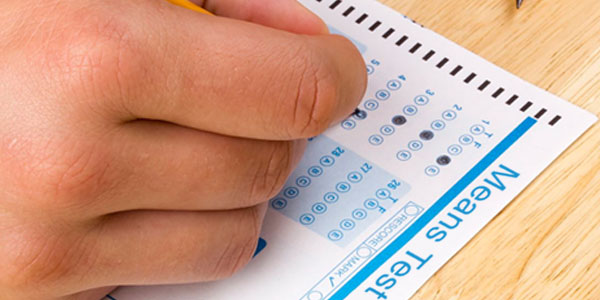To file bankruptcy, you’ll have to undergo means test. However, you’ll have to first check your state’s median household income.
In order to get rid of all your unsecured credit card debt as well as personal loans, you may opt for Chapter 7 bankruptcy. But, then it would become mandatory for you to pass the means test. As per the Bankruptcy Code, means test is part of the debt relief process and was put into effect as part fresh amendments made to the existing laws in 2005. Here’s the process followed in the means test:
1. Average Gross Monthly Income
The average gross monthly income is quite a tricky figure, and you may stand disqualified, even if you are unemployed. It is calculated based on your last six months’ income, so if you’ve lost your job some three months ago, then your average income will be greater than zero. It’s foolish, but the lawmakers thinks bankruptcy is too easy a way to get rid of debt, legally.
Hence, to get your gross monthly income, you’ll have to add up ALL your income made in the past six months and that includes social security benefits, any unemployment,, wages earned, spousal support, investment payments, etc. Take that total amount and divide it by six. This should give your monthly income over the past six months.
2. Household Income and your state’s median income
If your median household income is greater than the median, then you should consult a bankruptcy attorney before taking any legal step. You must pass the means test so as to continue with your chapter 7 bankruptcy protection petition, and there are a lot of tricks you may use just to get around the means test successfully.
In case, your income is more than 200% of the stipulated median in your state of residence, then it may become very difficult time for you to explain to the bankruptcy court and trustee, why a Chapter 13 bankruptcy repayment plan wouldn't be of any help to you. Honestly, they're probably right. In a chapter 13 bankruptcy payment plan, you could have an excellent way of your debt mess, since you’d have a great opportunity to discharge most of your unsecured debts. Moreover, you won't have to take the same hit on your credit score as is the case with Chapter 7 bankruptcy.
3. The Means Test
If you are forced to undergo a means test, then you’ll have to show that most of your financial obligations are consumer ones, and that they’re not related to any small business interests. The means test is basically a kind of bankruptcy form, referred to as 22A, and if you must take it, it's because a "presumption of abuse" has arisen on the basis of your income.
Moreover, it is highly recommended that you consult a bankruptcy attorney before attempting to take any steps towards a bankruptcy discharge. A competent bankruptcy attorney will protect your rights and your assets from the creditors, and will be an active part of your bankruptcy case.
Passing the Chapter 7 Means Test
Once you’ve passed the means test and your Chapter 7 bankruptcy petition accepted by the court, it may not be the most suitable debt relief alternative for you. Before you file for any Chapter under the bankruptcy law, it is important to first consider all the other options available at hand and the factors that are playing in your case. The most effective advice here would come from a seasoned bankruptcy attorney.
Failing the Chapter 7 Means Test
If you fail in the means test, then it would put a cap on your options to just Chapter 13 bankruptcy, as your last resort. But, you will have to make monthly debt payments (as approved by the bankruptcy court) over a five year period of time.
During these five years, you’ll have to follow strict budget rules - your spending behavior which will be under close watch by the court. Chapter 7 bankruptcy is mostly opted for this very reason, that is, in that it you wont have to make any monthly debt repayments. Still, Chapter 13 bankruptcy is the preferred mode of handling specific types of financial problems, particularly curing a default on a home loan.









